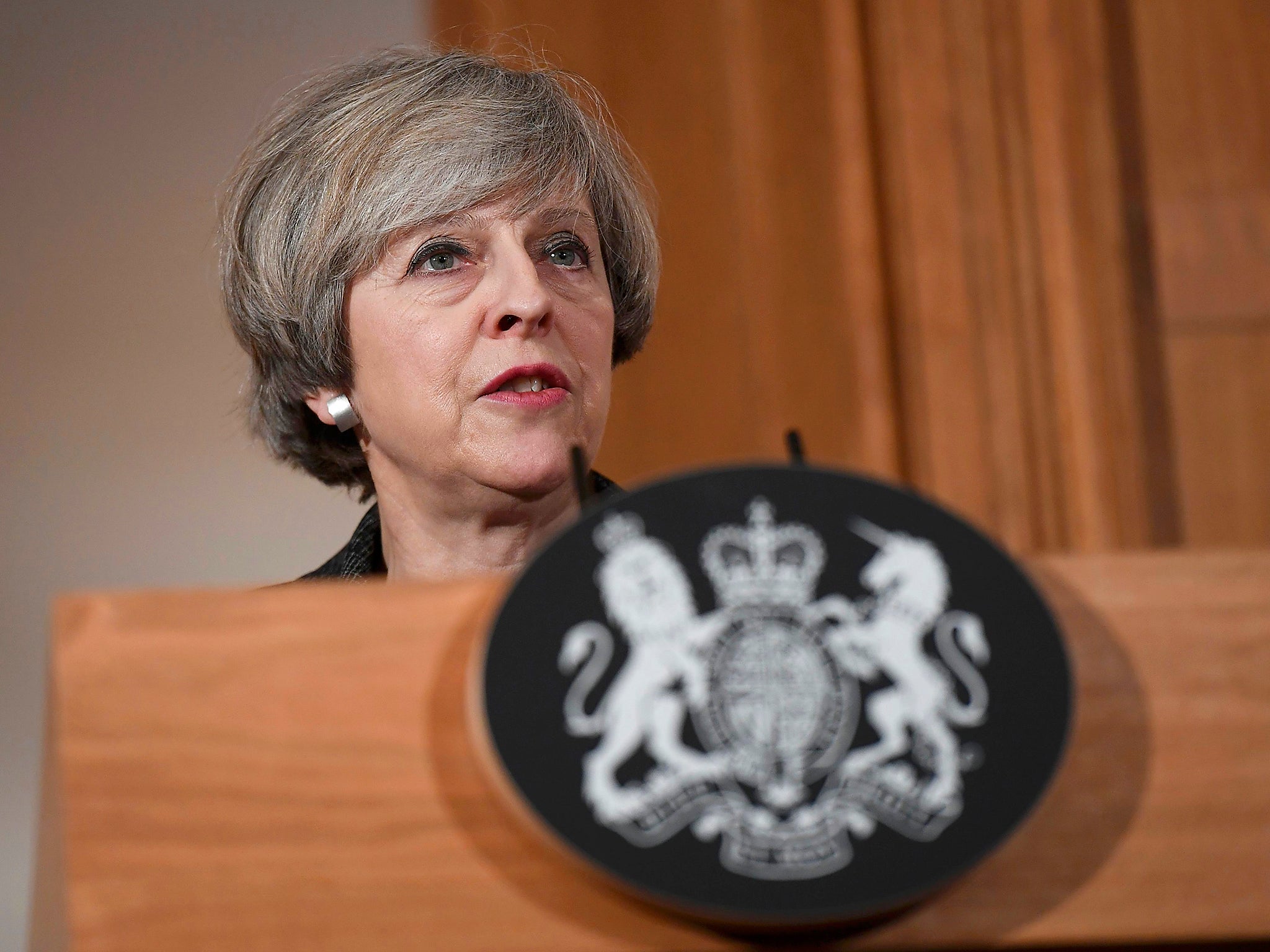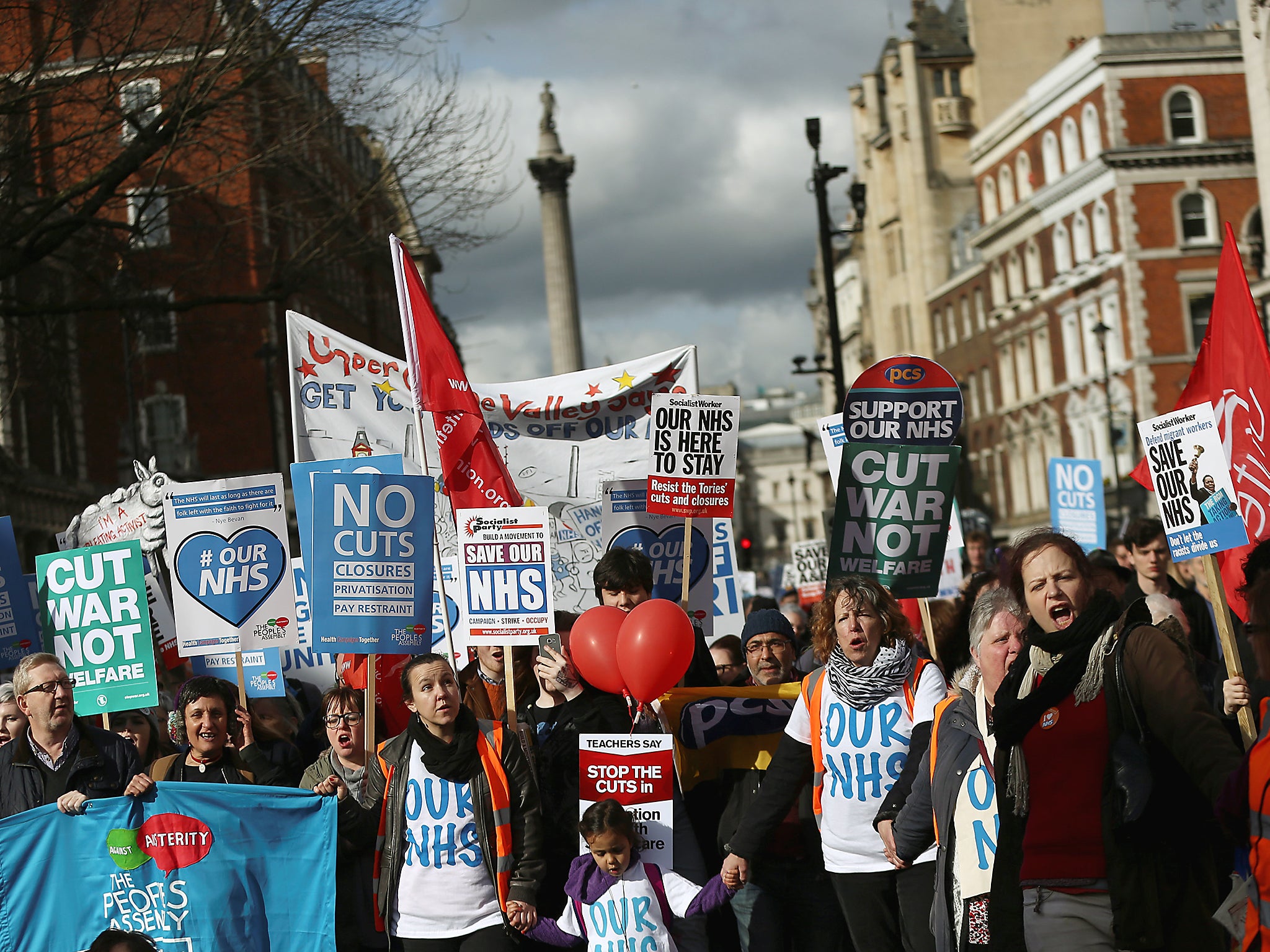Stop corporation tax cuts to save the NHS, Theresa May warned
Exclusive: Voters also call for social care funding and a tax cut for working families as Chancellor Philip Hammond prepares to unveil his spring Budget on Wednesday

Your support helps us to tell the story
As your White House correspondent, I ask the tough questions and seek the answers that matter.
Your support enables me to be in the room, pressing for transparency and accountability. Without your contributions, we wouldn't have the resources to challenge those in power.
Your donation makes it possible for us to keep doing this important work, keeping you informed every step of the way to the November election

Andrew Feinberg
White House Correspondent
An overwhelming majority of the British people want Theresa May to stop planned cuts to corporation tax worth £7.5bn and instead hand the desperately needed money to the NHS, an exclusive poll has revealed.
The BMG Research study showed more than three-quarters of people wanted Conservative plans to slash the business tax scrapped, with most believing the money should be passed to an ailing NHS that experts have warned is heading for catastrophe.
Huge backing for the move exposed in the poll for The Independent came from voters of every political persuasion, including those supporting Ms May’s Conservatives, from both genders, every age group and all areas of the country.
With just days to go before Chancellor Philip Hammond’s spring Budget, almost half of voters also put the NHS as their top priority, with a similar proportion believing the British economy would get worse over the next 12 months.
Pressure on the public finances is also expected to increase in coming years, meaning Mr Hammond is not likely to increase rates of spending on public services on Wednesday, despite recent official claims that patients could be at risk in overstretched hospitals.
The Chancellor has nonetheless showed no sign of ditching plans to reduce the UK’s already low corporation tax rates to 17 per cent by 2020.
Asked by pollsters if they thought money saved from the reduction should instead be transferred to the NHS, 77 per cent of people agreed – including 69 per cent of people who said they would vote Conservative if there were an election tomorrow.
At a time when the country is bitterly divided over Brexit, backing for the move was immense from people who voted both Leave (75 per cent) and Remain (80 per cent).
The UK’s main rate of corporation tax is currently 20 per cent, already far lower than France’s 33.3 per cent, Germany’s 29.7 per cent or Italy’s 31.4 per cent. But in 2015, George Osborne announced Britain’s rate would fall to 18 per cent by 2020 at a cost of £6.5bn to the taxpayer, according to documents released at the time.
A year later – and at an additional cost of £1bn – the Government said the rate would drop to 17 per cent by 2020, brining the total cost of the phased 3 per cent fall now due to start from this April to £7.5bn.
The survey also put a series of potential priorities to the 1,576 people polled and asked them to pick one as the most important. A total of 48 per cent opted for extra funding for the NHS, while 15 per cent called for more money for social care. A tax cut for working families and tax rise for the highest earners were the next most popular priorities, receiving 13 per cent of people’s backing, while 6 per cent requested more money for schools.
Just 3 per cent of those polled backed a move to help firms pay business rates, a demand from private-sector groups that dominated media coverage in mid-February amid fears over a planned revaluation of the tax.
The Government insists it is investing more in the health service, with Health Secretary Jeremy Hunt telling the Commons on Monday: “We are providing more doctors, more nurses, more funding and more operations than ever before in [the NHS’s] history.”
Nonetheless, numbers released by ministers show NHS England will face a sharp reduction of 0.6 per cent in real terms per head in the financial year 2018-19, a drop corroborated by NHS England chief executive Simon Stevens earlier this year when he said “in 2018-19, real-terms NHS spending per person in England is going to go down”.

A review by the Care Quality Commission has just found that safety at four in five hospital trusts in England is now not good enough, with hospital chief inspector Professor Sir Mike Richards commenting on Thursday that the NHS “now stands on a burning platform”, adding that the “need for change is clear”.
Dr Michael Turner, head of polling at BMG Research, said: “Over recent months the NHS has surged in importance, at one point overtaking Brexit as the single most important issue facing Britain.
“This is likely due to the intense public debate about it's funding in the run-up to the first of two national Budgets that are set to be delivered this year. With the funding crisis at the forefront of people's minds, close to two-thirds of Britons, 63 per cent, say that they want the Government to put more money into the NHS and social care."
The survey also revealed that the country was now bracing itself for a tougher economic time over the next year, with 42 per cent of people believing the national economic situation would worsen, compared with 17 per cent who thought it would improve.
Meanwhile, 36 per cent said they believed their own household finances would worsen, compared with just 16 per cent who thought they would improve.
BMG Research interviewed a representative sample of 1,576 adults living in Great Britain online between 27 February and 3 March 2017. Data are weighted. BMG are members of the British Polling Council and abide by their rules
Subscribe to Independent Premium to bookmark this article
Want to bookmark your favourite articles and stories to read or reference later? Start your Independent Premium subscription today.
Join our commenting forum
Join thought-provoking conversations, follow other Independent readers and see their replies
Comments